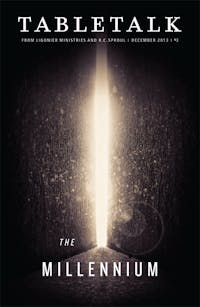
Request your free, three-month trial to Tabletalk magazine. You’ll receive the print issue monthly and gain immediate digital access to decades of archives. This trial is risk-free. No credit card required.
Try Tabletalk NowAlready receive Tabletalk magazine every month?
Verify your email address to gain unlimited access.
When Alice found herself at a crossroads in Wonderland, she looked about for help. There in a tree nearby was a smile. Just a smile. Soon though, the full body of the Cheshire Cat appeared. Alice asked the cat which way she should go. The cat asked her where she was headed. Alice explained to him that she had no particular destination, and then the cat spoke words of wisdom—”Then it doesn’t matter.”
If we are going nowhere we cannot go wrong. You can only get lost if you have a destination. Which is why eschatology matters. Rightly understood, eschatology, the study of the last things, is the study of where we are headed.
Trouble is, more often than not, we find ourselves going down a dead-end road because we’ve gotten distracted by mileposts along the way. We end up arguing about where we are or where we almost are, and we utterly lose sight of the real end of the story.
The Bible speaks of a millennium. It does so in the midst of a profoundly difficult bit of inerrant literature—John’s Apocalypse, the book of Revelation. And all that the Bible teaches is understandable. God doesn’t waste His time or ours telling us about things we can’t possibly understand. So there is a sound view on the millennium that is biblical, knowable, and valuable. We should seek to affirm and grasp that view.
The millennium, however, is not the end, in either sense of the word. It is not the reason for all things; neither is it the last of all things. It should not, therefore, deeply divide and separate us.
Some views assert that we are in the midst of the millennium, that this language refers to the time between the ascension of Christ and His return. Some views affirm that the world will grow progressively worse, and then Jesus will return to rule for a thousand years. Still others affirm that the world will grow increasingly faithful to God’s Word, that we will enjoy a thousand-year golden age before Jesus returns. That’s rather a lot of differences between millennial views.
But do you notice what one thing each of these views shares? Whatever position one might take, in the end we all agree on one thing: Jesus wins. When history is complete, every knee will bow and every tongue confess that Jesus Christ is Lord. When history is complete, all His enemies will have been made into His footstool. When history is complete, there will be no more tears, no more sickness, no more death. When history ends, that which we now are called to seek, the kingdom of God, will be consummated. What we seek will have been found in all its glory, in all its fullness.
There is, however, one more step before the end, one part of the story we are wont to miss out on. The real end, the true end, is not found in the final chapters of Revelation but in Paul’s first letter to the church at Corinth, chapter 15. There we read, “Then comes the end, when he delivers the kingdom to God the Father after destroying every rule and every authority and power” (v. 24). The end is when the Son, after bringing all things under subjection, delivers the kingdom to His Father. Then the second Adam, having completed the calling given to the first Adam that the earth would be filled and subdued, will hand back to His Father the creation that had been put under our stewardship.
How can we miss that? How has our story left out this great climax? The Son returns the kingdom to the Father. We must come to grasp this, as it is precisely this glorious truth that animates our labors here and now. The kingdom that we seek first is this same kingdom that the Son returns to the Father. Our labors in the here and now, insofar as they reflect and flow out of our commitment to the reign of Christ, no matter what happens between now and the end, will survive. Our work matters into eternity. Or, as one wise theologian is apt to describe it, right now counts forever.
Our efforts, our labors in raising our children in the nurture and admonition of the Lord, in calling out the elect from the four corners of the earth, of taking God’s dust and molding and shaping it into widgets, this is not just pursuing the kingdom of God but manifesting it. It is neither what we do while we wait for the end, nor what we do to bring to pass our favorite millennial view. Rather it is what we do to move the story to the end of the end, the Son returning the kingdom to the Father.
And that, of course, is also the beginning of the beginning. From there we will enjoy in the true and eternal Mount Zion—in the New Jerusalem—the very presence of the living God. We will take in the beatific vision, beholding His glory. We know the end, both the purpose and the goal of the story—Jesus wins, to the glory of the Father. And by His grace, He takes us with Him. That’s our reason for living, and our hope in dying.
